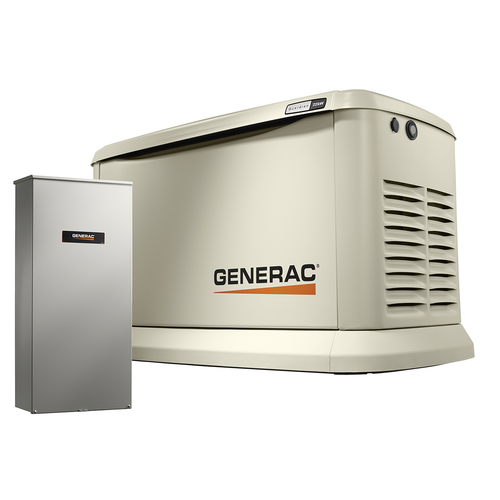
Key Highlights
- Home backup generators connect to your home’s electrical panel. They give automatic power when the main source fails.
- Power outages can happen unexpectedly and disrupt our daily lives.
- These generators use natural gas or liquid propane and need to be installed by a professional.
- Backup generators come in different sizes and fuel types to meet your needs.
- Picking the right size generator is important. It depends on how much power your home uses.
In today’s world, having a reliable power supply is very important for our daily comfort. A home backup generator gives you peace of mind by supplying backup power during sudden outages. These home generators connect easily to your home’s electrical system with a transfer switch. This setup keeps essential appliances and devices working without interruption. You can choose between a standby generator, which is installed outside your home, or a portable option for smaller power needs. Knowing the details about these systems is important.
Let’s Learn More About Home Backup Generators
A home backup generator is a smart choice. It keeps your house powered during outages and gives you peace of mind. Picture this: a storm comes and takes out the power lines. Rather than being in the dark, your backup generator turns on within seconds. It keeps your lights shining, appliances working, and family comfortable.
These generators connect directly to your home’s electrical panel and a fuel source, like natural gas or liquid propane. When power goes out, the automatic transfer switch safely cuts your home off from the grid. At the same time, it starts the generator, bringing power back to chosen circuits.
The Importance of Having a Backup Generator in California
California is famous for its innovation and technology. However, it is dealing with more power outages lately. This is due to extreme weather, old infrastructure, and high electricity needs. The number and length of these outages have gone up in recent years. This and other problems are hurting homes and businesses throughout the state.
Now, a backup generator is a need for homeowners in California, not just a nice extra. These outages don’t just cause trouble; they can put safety at risk and lead to financial losses. Residents deal with spoiled food, missed work, and failed security systems, to name a few issues. Buying a backup generator gives peace of mind. You can relax, knowing your home will stay safe and functional, no matter what happens with the utility company.
How Backup Generators Provide Power During Outages
The secret to how quickly a backup generator works is the automatic transfer switch (ATS). This important part is what handles power management by always checking your home’s utility power. When the ATS sees a problem, it quickly turns on the backup power system.
The generator starts running and makes electricity. The ATS then moves the power supply from the utility grid to the generator. This whole process happens by itself in just a few seconds, making the switch to backup power hardly noticeable.
Once the utility power returns, the ATS notices it. It smoothly moves the electric load back to the utility grid and turns off the generator. This gets it ready for the next power outage.
Types of Backup Generators for Your Home
Choosing the right backup generator for your home means taking different factors into consideration. These include fuel type and how easy it is to move. Each fuel type has its own benefits and fits different needs.
Natural Gas vs. Diesel: Pros and Cons
When you are picking between natural gas and diesel generators, you should think about your power needs, how much fuel you can store, and the impact on the environment. Here are the good and bad points for each type:
| Natural gas generators | Diesel generators | |
| Pros | It’s easy to use. Fuel comes directly to your home. It’s also better for the environment as It releases fewer harmful gases than diesel. | It’s more powerful. It works well for bigger homes that need a lot of energy. You can also run it longer with a full tank. |
| Cons | You need a special connection for natural gas. It may not produce as much power as diesel generators. | You’ll need extra tanks to store the fuel. It creates more pollution compared to natural gas. |
Portable vs. Standby Generators: What’s Best for Your Home?
Understanding the differences between portable and standby generators is important. This helps you find the right one for your home’s power needs and budget.
| Portable generators | Standby generators | |
| Pros | Affordable: A good choice for backup power without spending too much. Movable: Great for camping or running tools. | Automatic operation: It turns on by itself during power outages. Powerful: It can run important appliances and systems. |
| Cons | Manual operation: You have to set it up and connect it yourself. Limited power output: It might not be able to power your whole home. | Higher cost: It’s more expensive than portable generators. Requires professional installation: This helps to ensure it’s set up and connected correctly. |
Selecting the Right Size Generator for Your Needs
Getting the right size generator is very important. It helps ensure that it can support your home’s electric needs during power outages. If you pick a generator that is too small, it won’t provide enough power for your appliances. On the other hand, choosing one that is too big may lead to extra costs and wasted fuel.
Start by figuring out how much power your home needs. Make a list of all the appliances and devices you want to use when the power is out. Next, add up the total wattage needed, considering both starting and running wattage for each appliance. You can talk to an electrician or use online generator sizing calculators. They can help you find the best option for your specific needs.
Tips for Choosing the Appropriate Generator Capacity
Choosing the right generator size is very important for having good power during outages. Here are some things to think about:
- Future needs: Think about any appliances you may add later when picking a generator. A bigger generator can handle future growth. This choice can save you money and work in the future.
- Reputable brands: Choosing trusted brands like Briggs & Stratton, Kohler, and Generac Guardian means you will get quality and reliable service. These brands are known for being strong and have great features. They also provide good warranties, which gives you peace of mind.
- Lifestyle and budget: Think about your budget and how often you lose power. If power failures are rare and short, a smaller generator may be enough. But if you often lose power for a long time, a bigger generator is better. This is especially true for homeowners who need continuous power for things like medical devices or sensitive electronics.
Install a Backup Generator and Experience Reliability Like Never Before
Investing in a good backup generator is very important for a constant power supply, especially in places like California where outages happen often. Knowing the different types of generators and how to size them helps you pick the right one for your needs. Think about things like fuel type and how easy it is to move when you decide. Having a backup generator can protect your home from surprise power cuts and keep you comfortable and safe during tough times.
If you’ve decided on a backup generator, contact us at Precision Air Solutions for advice and installation.
